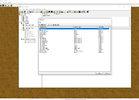Summary:
On a map with hundreds of units, i need that every unit has more than 10 customizable values, other than life or mana.
Objective:

Suposse that i want to make a map about growing units that are watermelons.
Every watermelon has its own ripeness, an own harshness, an own humidity, sweetness, seediness, chillness, and 10 other fields.
These are "characteristics".
Their characteristics change, for example:
When someone throws water on a watermelon, this watermelon gets its humidity value increased.
When some watermelons roll near a sugar field, these watermelons have their sweetness increased.
But every watermelon has its own, not all of them have the same humidity or and sweetness, or ripeness.
I do not care if the characteristics are not visible, i just need to have the value of each watermelon stored somewhere.
Problems to face:
Units do not have a personal indicator of sweetness or ripeness, in place they come with indicators of life, mana, others.
The watermelon characteristics that i invented are not 2 or 4, they are more than 20.
Trials:
I tried to pretend the life to be their ripeness, mana simulate the humidity, turn value to be the saltness, and others.
There are not abundant fields for that.
This leads to too much memorizing.
Request of solution:
Should i use arrays or hash tables to save and store how ripe each watermelon is, or how much humidity every watermelon has, etc.?
Could you do this without making, for example, an ability for ripeness and changing its level to indicate how ripe it is, or making an ability for humidity to know and obtain the watermelon's humidity?
Greetings:
Thank you.
On a map with hundreds of units, i need that every unit has more than 10 customizable values, other than life or mana.
Objective:
Suposse that i want to make a map about growing units that are watermelons.
Every watermelon has its own ripeness, an own harshness, an own humidity, sweetness, seediness, chillness, and 10 other fields.
These are "characteristics".
Their characteristics change, for example:
When someone throws water on a watermelon, this watermelon gets its humidity value increased.
When some watermelons roll near a sugar field, these watermelons have their sweetness increased.
But every watermelon has its own, not all of them have the same humidity or and sweetness, or ripeness.
I do not care if the characteristics are not visible, i just need to have the value of each watermelon stored somewhere.
Problems to face:
Units do not have a personal indicator of sweetness or ripeness, in place they come with indicators of life, mana, others.
The watermelon characteristics that i invented are not 2 or 4, they are more than 20.
Trials:
I tried to pretend the life to be their ripeness, mana simulate the humidity, turn value to be the saltness, and others.
There are not abundant fields for that.
This leads to too much memorizing.
Request of solution:
Should i use arrays or hash tables to save and store how ripe each watermelon is, or how much humidity every watermelon has, etc.?
Could you do this without making, for example, an ability for ripeness and changing its level to indicate how ripe it is, or making an ability for humidity to know and obtain the watermelon's humidity?
Greetings:
Thank you.
Last edited:
























